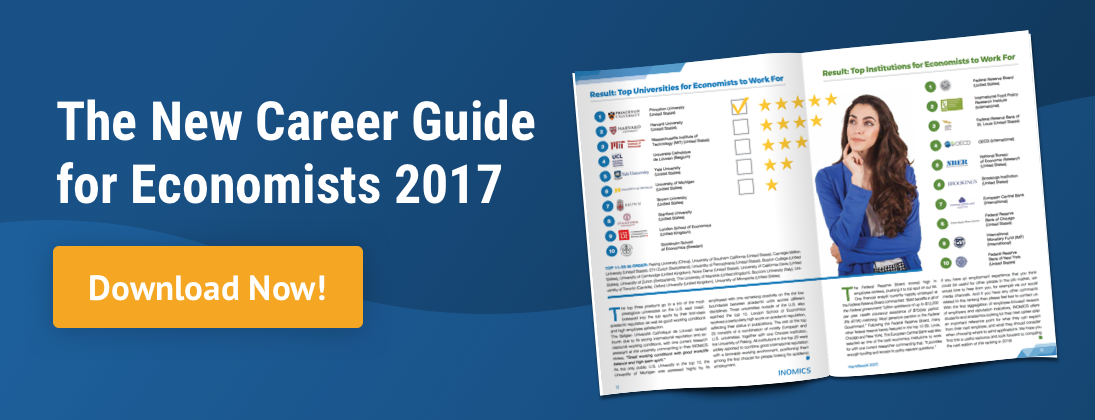
How to Switch from Academia to Industry
Read a summary using the INOMICS AI tool
This article was featured in the INOMICS Handbook 2017, a new career guide for Economists. Download it here.
For researchers who are thinking about moving into industry, there are a huge range of employment possibilities outside of academia. The advantages of such a move may include greater job security, better pay, greater opportunities for career progression, and a more goal-oriented research culture. But the culture of business can come as a shock to those who have spent all their work time in universities.
If you're thinking about making the switch from academia to industry, we're here with some advice on how to find and apply for the position which is right for you, and how to manage the transition into the industry world.
Transferable skills
The first step in finding the industry career options that would suit you the best is to identify the skills you've acquired in academia, and to see how these skills could be transferable to an industry setting. Those who have a background in academia almost certainly have excellent writing skills, critical thinking skills, and the ability to review research literature and write reports on it. Depending upon your specific field, you may also have data analysis experience, mathematical and statistical expertise, programming knowledge, and oral presentation skills. All of these will serve you well in an industry context, so identify you particular areas of strength and look for job opportunities which focus on these skills.

Networking and advertising yourself
In order to hear about industry opportunities and to let employers know that you're available for hire, you need to make use of your professional network and to promote yourself as a professional presence. Some academics can be a bit squeamish about networking or self promotion, but it is an essential part of job hunting and need not be an unpleasant experience. You should ask around your friends and colleagues about any positions which they are aware of, particularly if you've worked with them in the past and they can give you a recommendation to an employer. You should obviously update your CV, but also consider writing a blog or white paper on topical issues in your field, and getting active on social media sites such as Twitter or LinkedIn. Show industry employers that you have unique knowledge of your field which can benefit them.
Finding opportunities
In order to hear about the latest opportunities in industry, you'll need to expand your job searches beyond the bounds of academia. As mentioned above, networking is important to help you hear about jobs through word of mouth. You can also search online, making use of websites which post listings of job opportunities as they arise. However, don't forget to check email mailing lists as well – often being on the right mailing list will allow you to be among the first to hear about new positions. Also consider the time of year at which you undertake your job search. Summer is generally the slow season, with fewer projects being started or hirings being made. So you may have more success in your job search if you focus on spring, autumn or winter times.
Business culture
It's important to remember that there are significant cultural differences between academia and industry. Industry tends to be more formal than academic settings, so bear this in mind when you attend a job interview. Industry typically promotes more formal attire than academia, so leave the corduroys and trainers at home and opt for a suit or a shirt and smart trousers when meeting prospective employers. Also, don't be afraid to sell yourself. Speak with confidence and be prepared to offer evidence of your skills and abilities. Having extensive academic qualifications is an advantage to help you get to an interview stage, but you need to show employers that you can apply those skills to real-world problems. Consider putting together a portfolio of projects that you've worked on, such as the successful completion of a research project or a conference which you organized. This way you can show the concrete successes that you were able to produce and demonstrate your abilities to employers.
There are some great advantages of switching to industry for researchers, so we hope these tips serve you well in your job searching.
-
- Postdoc Job
- (Remote)
- Posted 3 weeks ago
Vacancy for a Postdoctoral fellow
At University of Ghent in Gent, Belgium
-
- Postdoc Job
- Posted 1 week ago
6-Year Postdoc with Option for a PermanentContract (f/m/d, 100%)
At ZEW – Leibniz-Zentrum für Europäische Wirtschaftsforschung GmbH Mannheim in Mannheim, Germany
-
- Workshop
- Posted 1 week ago
Geopolitical Alignment, Tensions, and the Global Economy (Measurement and Evidence)
Between 4 Dec and 4 Dec in Nanterre, France













